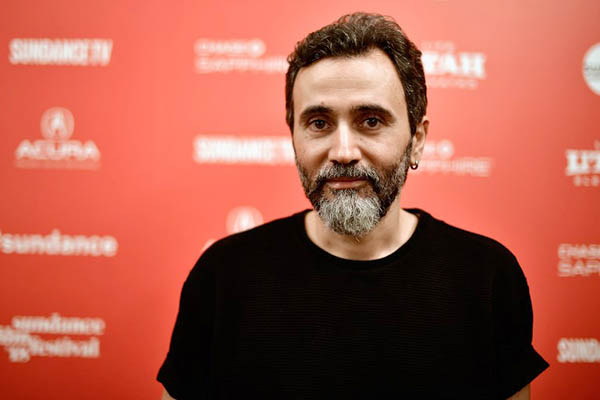
Filmmaker Talal Derki. Matt Winkelmeyer-Getty Images North America—AFP
‘Of Fathers and Sons’ offers a bleak look at the children who train for war in Syria
A group of children giggle as they play in a dusty, barren landscape near their home in northern Syria, but this is no ordinary game of catch, for their ball is a live bomb. The macabre game of chicken is one of the most blood-chilling scenes in Of Fathers and Sons, filmmaker Talal Derki’s disturbing new expose on the grip of Islamism in his native Syria.
“This is the scene that broke my heart,” Derki told AFP in an interview in Los Angeles this week, recalling the blood-chilling episode. “I was seeing my six-year-old boy through the lens.”
For more than two years, the celebrated filmmaker lived with an Islamist family in a war-ravaged region bordering Turkey, focusing his camera primarily on the children to capture their gradual radicalization. The result is a bleak and haunting 98-minute documentary that gives viewers rare insight into the brutal daily life of jihadists, who in recent years have sown fear across the globe.
“I call it the nightmare,” the 41-year-old filmmaker said, referring to the spread of the jihadist movement.
The film, released in the United States on Thursday, won the world cinema documentary competition at the Sundance Film Festival earlier this year. Derki’s previous documentary, Return to Homs, won the grand jury prize at Sundance in the same category in 2014.
Of Father and Sons tracks Abu Osama, one of the founders of Al-Nusra, an Al Qaeda affiliate group, as he leads two of his eight sons—Osama, 13, named after dad’s personal hero Osama bin Laden, and Ayman, 12, named after the current Al Qaeda leader Ayman al-Zawahiri—down the path to jihad.
Berlin-based Derki said he gained Abu Osama’s trust by posing as a war photographer sympathetic to the jihadist cause and lived on-and-off with the family for two-and-a-half years, sharing their most intimate moments.
The horror in the film doesn’t come from violence and blood and gore, Derki said. Rather the viewer is sickened as the documentary charts the children’s brutal transformation from innocent youths to jihadi fighters.
“This is a film that makes you understand how the brain functions,” Derki said. “You have the horror in the language, in the education, in a single moment.”
He said he is still haunted by several scenes in his film, notably the one with the children playing with the makeshift bomb. In another scene, one of the children proudly boasts to Abu Osama—which means father of Osama in Arabic—about killing a little bird.
“We put his head down and cut it off, like how you did it, father, to that man,” the boy proclaims.
The bombed-out desert landscape that the family calls home and the fact that the family’s women are never shown or even heard adds to the sense of despair throughout the film. “The women are the biggest victims in this society,” Derki said. “I was there for two and a half years and I didn’t even know what the mother of these children looked like. Her name was not uttered and her voice was never heard.”
Derki said that while his first documentary, Return to Homs, tracked the evolution of the Syrian uprising and the regime’s brutal crackdown, Of Fathers and Sons was an obvious next chapter in his quest to explain the country’s slide into chaos. “We have to use our weapon—which is cinema—to show what is really going on there, who these people are, how they brainwash societies,” he said. “We have to think before we bomb any area, before we let a dictator kill his own people with heavy weapons,” he added.
Derki said Of Fathers and Sons has had such a profound psychological impact on him that he has put down the camera for now as he concentrates on healing. “I am still recovering,” he said. “I have to take medication to fall asleep, otherwise I have nightmares.”
He added that after the final shoot he got his right arm tattooed and his ear pierced to ensure he would not be tempted to try and embed with jihadists in the future. “If you have tattoos or piercings, you cannot be with them,” he said. “So this was my way of making sure I don’t go back.”
